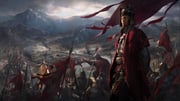cao cao
Cao Cao (曹操), courtesy name Mengde (孟德), was a Chinese statesman, warlord, and poet who rose to power towards the end of the Eastern Han dynasty and became the effective head of the Han central government during that period. He laid the foundation for what was to become the state of Cao Wei (220–265), established by his son and successor Cao Pi, who ended the Eastern Han dynasty and inaugurated the Three Kingdoms period (220–280).
Cao Cao rose to prominence in the 190s during which he recruited his own followers, formed his own army, and set up a base in Yan Province (covering parts of present-day Henan and Shandong). In 196, he received Emperor Xian, the figurehead Han sovereign who was previously held hostage by other warlords such as Dong Zhuo, Li Jue, and Guo Si. After he established the new imperial capital in Xuchang, Emperor Xian and the central government came under his direct control, but he still paid nominal allegiance to the emperor. Throughout the 190s, Cao Cao actively waged wars in central China against rival warlords such as Lü Bu, Yuan Shu, and Zhang Xiu, eliminating all of them. Following his triumph over the warlord Yuan Shao at the Battle of Guandu in 200, Cao Cao launched a series of campaigns against Yuan Shao's sons and allies over the following seven years, defeated them, and unified much of northern China under his control. In 208, shortly after Emperor Xian appointed him as Imperial Chancellor, he embarked on an expedition to gain a foothold in southern China, but was defeated by the allied forces of the warlords Sun Quan, Liu Bei, and Liu Qi at the decisive Battle of Red Cliffs.
His subsequent attempts over the following years to annex the lands south of the Yangtze River never proved successful. Cao Cao died in Luoyang in March 220 and was succeeded by his son Cao Pi, who accepted the abdication of Emperor Xian in November 220 and established the state of Cao Wei to replace the Eastern Han dynasty. This marked the transition from the Eastern Han dynasty to the Six Dynasties period. After taking the throne, Cao Pi granted his father the posthumous title "Emperor Wu" ("Martial Emperor") and the temple name "Taizu" ("Grand Ancestor").
Adaptations in popular culture:
- Shin Sangoku Musou (Dynasty Warriors)
- Sousou "Karin " Moutoku from Koihime Musou
- Sousou Moutoku from Ikkitousen
- Sousou Moutoku from Sangoku Hime







